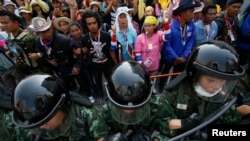BANGKOK —
Economists are warning of slower economic growth in Thailand while the country is gripped by political unrest. The U.S. ratings agency Fitch warns a prolonged political standoff could have a lasting negative impact on Thailand’s economic performance and financial stability.
In its report, Fitch pointed to a contraction in manufacturing, sharply lower retail sales growth, and consumer and business confidence at the lowest levels since the disastrous floods of late 2011.
The report followed weekend national elections that remain inconclusive and ongoing street protests by anti-government protesters. As the political conflict appears headed for the courts, foreign investors are voicing concern.
Investors looking elsewhere
President of Toyota Motor Corp in Thailand, Kyoichi Tanada, has warned long term investors may look to invest elsewhere such as Indonesia and Vietnam.
Chris Baker, an analyst and author on business in Thailand, says major foreign investors are fearful the inconclusive election, with by-elections and legal challenges to come, will unsettle investors.
"The major concern is about decision making they are getting worried; particularly the car makers and related industries," said Baker. "They are getting worried the government, that there's little chance in the near future of having a government that's going to be making serious decisions and this is a big disincentive for them."
Thailand’s caretaker government is currently under tight financial pressure to make payments to rice farmers, who are owed more than $3 billion under a controversial rice pledging scheme. The government has struggled to raise the funds and has been unable to secure funding from banks.
Foreign investors have been pulling back from the Thai stock market since political protests began in early November. The stock exchange index has shed 10 percent since then, although it has stabilized in recent days.
Despite the gloomy outlook, Andrew McBean, a partner with consultancy Grant Thornton Thailand, says the fact that Sunday’s elections were largely peaceful was a hopeful sign.
“There's some comfort from the weekend and the fact that it went without violence. What has emerged from this is quite a pragmatic business approach throughout the whole of it," he said. "Thailand continues to have a positive GDP [gross domestic product] - it continues to grow albeit not as well as its true potential."
Tourism has been hard hit especially in the capital Bangkok where the government instituted a state of emergency as anti-government protests moved to block key intersections in the city. More than 45 countries have issued travel alerts in recent weeks, and tourism authorities estimated losses for January alone at some $685 million.
The kingdom has weathered economic setbacks and political unrest before, earning it the name “Teflon Thailand.” But many worry that the longer the political unrest continues, the longer it will take for the country to regain its tourist and business-friendly image.
In its report, Fitch pointed to a contraction in manufacturing, sharply lower retail sales growth, and consumer and business confidence at the lowest levels since the disastrous floods of late 2011.
The report followed weekend national elections that remain inconclusive and ongoing street protests by anti-government protesters. As the political conflict appears headed for the courts, foreign investors are voicing concern.
Investors looking elsewhere
President of Toyota Motor Corp in Thailand, Kyoichi Tanada, has warned long term investors may look to invest elsewhere such as Indonesia and Vietnam.
Chris Baker, an analyst and author on business in Thailand, says major foreign investors are fearful the inconclusive election, with by-elections and legal challenges to come, will unsettle investors.
"The major concern is about decision making they are getting worried; particularly the car makers and related industries," said Baker. "They are getting worried the government, that there's little chance in the near future of having a government that's going to be making serious decisions and this is a big disincentive for them."
Thailand’s caretaker government is currently under tight financial pressure to make payments to rice farmers, who are owed more than $3 billion under a controversial rice pledging scheme. The government has struggled to raise the funds and has been unable to secure funding from banks.
Foreign investors have been pulling back from the Thai stock market since political protests began in early November. The stock exchange index has shed 10 percent since then, although it has stabilized in recent days.
Despite the gloomy outlook, Andrew McBean, a partner with consultancy Grant Thornton Thailand, says the fact that Sunday’s elections were largely peaceful was a hopeful sign.
“There's some comfort from the weekend and the fact that it went without violence. What has emerged from this is quite a pragmatic business approach throughout the whole of it," he said. "Thailand continues to have a positive GDP [gross domestic product] - it continues to grow albeit not as well as its true potential."
Tourism has been hard hit especially in the capital Bangkok where the government instituted a state of emergency as anti-government protests moved to block key intersections in the city. More than 45 countries have issued travel alerts in recent weeks, and tourism authorities estimated losses for January alone at some $685 million.
The kingdom has weathered economic setbacks and political unrest before, earning it the name “Teflon Thailand.” But many worry that the longer the political unrest continues, the longer it will take for the country to regain its tourist and business-friendly image.





